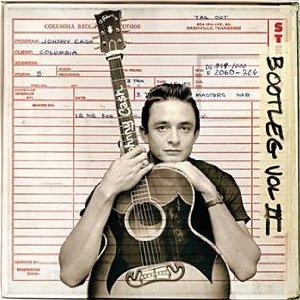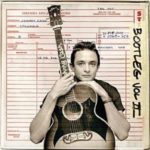
Columbia/Legacy
From Memphis To Hollywood: Bootleg II is the latest release from the Johnny Cash archives, providing a great overview of the music Cash produced from 1954 to 1969. As an affordable audio scrapbook of Cash’s work over that 15-year period, it works perfectly. For many, however, the first disc of the two-CD collection may receive the most play as it captures a young Johnny at a point where he was hardly known – but was already the talent the world came to know in the years ahead.
Let’s skip ahead to Disc II, which covers Cash’s first 11 years with Columbia Records after signing with them in 1958. If you lived the 60s, there are tunes here that can’t help but be ingrained into your DNA (be honest: doesn’t hearing the theme to “Johnny Yuma” bring back some ancient memory of scrambling to find your cowboy hat to wear while lying on the living room floor in front of the set?). Hand-in-hand with the ride down memory lane is the fact that it was the 60s, with all the studio slickness that was the norm. There’s no mistaking Cash’s voice for anyone else, but between the two halves of Bootleg II, the latter may be more for completist purposes than repeated listens.
I’m saving the first (and the best) for last here as Disc I is the real treasure trove of Bootleg II, offering a live radio performance time capsule from 1955, a bunch of unreleased Sun Records demos, and some outtakes and rarities – both Cash-penned and covers.
Crank it up, sit back, and settle into a handsome Saturday afternoon – 75 degrees at the KWEM studio in Memphis, TN just before 4:00 PM on May 21, 1955 to be exact. This is live radio, folks – with no place to hide a stumbled word, a bungled lick, or a broken string. The on-air announcer runs down through a listing of movies at the local theater, then does a quick blurb for Home Equipment Company (who was not only Cash’s sponsor, but his employer, as well – at that point in time, he was still working as a salesman for the household product outfit located across the street from KWEM). And then the announcer sets Cash and his Tennessee Two loose.
The recording’s mono sound is the perfect vehicle for capturing the power of Cash’s performance with Marshall Grant (upright bass) and Luther Perkins (electric guitar). This is a solid, big-blocked rhythm machine – the fact that there is no actual drummer means nothing. Grant provides a foundation for Cash to drive the beat with his acoustic guitar while Perkins swaps between palm-muted chords and little bursts of smooth, melodic runs on his Fender Esquire. It’s country music, for sure, but when Cash tears into the vocal on the opener “Wide Open Road”, you can’t help but think about the rock ‘n’ roll (and punk) to come. The 15-minute radio show captured here is more than a wonderful trip back to where Johnny Cash’s career was at 56 years ago; it’s a scoop of the primordial ooze that begat a whole lot of the music that changed the world.
Cash sounds a little nervous between songs as he extols the virtues of Home Equipment Company’s aluminum awnings and asks the folks at home to mail in their song requests for future shows, but his vocals on the four tunes during the KWEM show are powerful and confident. It was a combination that he never lost in the decades to come: the humble everyman who never assumed that everyone knew his name when he walked on stage (“Hello – I’m Johnny Cash”) and the one-of-a-kind voice that came from somewhere very, very deep in the soul. The “On The Air” portion of Bootleg II is worth the price of the album all on its own.
From there we’re treated to a charge of demos from the Sun Records era – most simply raw Cash vocals backing himself on acoustic guitar. There are the well-known Cash classics like “I Walk The Line” and “Get Rhythm”; there are the spirituals, both gentle (“He’ll Be A Friend”) and slightly edgier (“Belsazzar”); and there’s the churning, rough-hewn rockabilly of “Rock and Roll Ruby”. Also included on Disc I are a cluster of outtakes from Cash’s early days at Sun, including an aborted pass at Jimmie Rodger’s “Brakeman’s Blues” and a greasy version of “Big River” – a perfect snapshot of what Cash, Grant, and Perkins were capable of producing for sound. It’s all good stuff.
Cash scholars may argue that some of this music is available in various chunks elsewhere (including the live radio cuts, which were featured on a limited-edition bonus CD in 2005’s The Legend box set), but no matter. For a one-stop collection of vintage Johnny from the late 1950s through the 60s, the soul, spirit, and time-traveling abilities of Bootleg II cannot be beat.



No Comments comments associated with this post